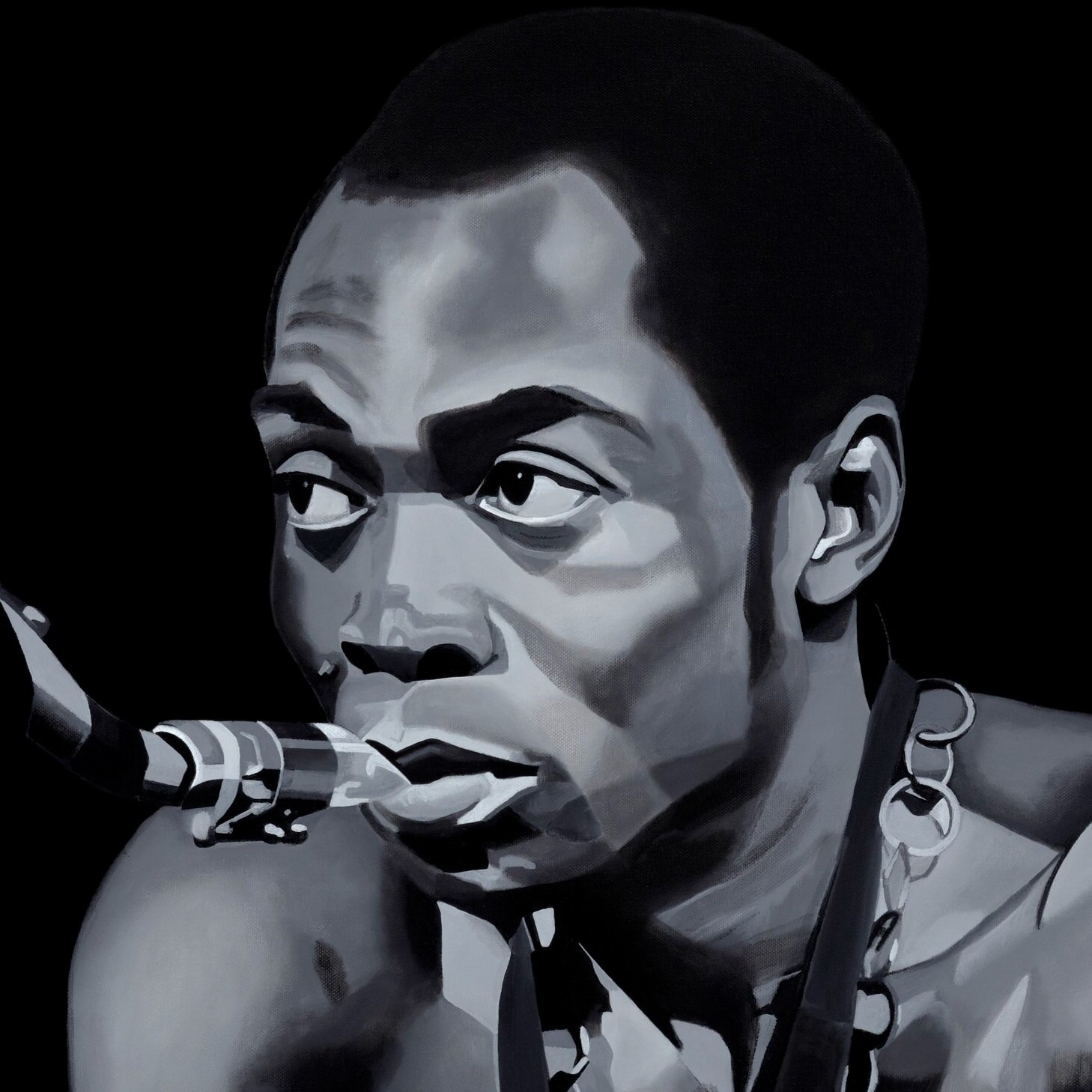Head of State - 2021
Head of State is a portrait of the iconic Fela Kuti. As a revolutionary musician and eminent pioneer of the Afrobeat genre, Fela forthrightly used his creative talent to combat the detrimental effects of colonialism and champion his traditional Yoruba culture. Regardless of the many forms of personal attacks from the Nigerian government towards him and his loved ones, he persevered and continued to liberate people through the profound messages in his music.
“The human spirit is stronger than any government or institution."
- Fela Kuti
Fela Anikulapo Kuti was born Olufela Olusegun Oludotun Ransome-Kuti on the 15th October 1938 in Abeokuta, Nigeria. His mother was a teacher, feminist and activist and his father was an Anglican minister, school principal, and the first president of the Nigerian Union of Teachers. His dad died of cancer when he was only 17 years old.
In 1958 Fela Kuti travelled to London to study medicine however within days of arrival he changed his mind and enrolled in a course in classical music at the Trinity college of music. Fela had learnt to play the piano and drums at the age of 8. He had also led his school choir. Whilst at college he formed a band called the Koola Lobitos. They played the unique sound dubbed highlife that originated in Ghana. The sound was influenced by percussion, trumpets and horns. When he finished his studies in 1961 Fela and his band had become one of London’s most popular bands in the underground craze of African dance music.
Whilst in London he met Remi who he had his first 3 children with. After returning to Nigeria Fela adjusted to family life and parenting. He worked as producer at a Nigerian broadcasting corporation. However, he missed performing on stage and subsequently resigned from his job. He went back to playing highlife and formed a new band with same name Koola Lobitos though the name of his band changed several times throughout his career.
In 1969 Fela and his band went to the United States of America on a 10 month tour where he met Sandra, an African-American Civil Rights Activist who was a part of The Black Panther Party. She introduced him to the writings of Malcolm X and other black radicals. His new findings greatly inspired his music and political views. His mother’s impact also influenced him to create music that Nigerians could connect with.
Once back in Nigeria he started a new musical journey. He introduced the world to his new revolutionary genre Afrobeat. It was known for lots of instruments including horns, strong percussion, African chants, as well as lights and dancers. He changed the name of his band to Fela Kuti and Africa 70.
Fela formed a commune called the Kalakuta Republic where he lived and recorded music. It was also a home for many people connected to him and the band. He also launched a night club called the shrine. Both grew very popular with the youth and he used his platform to encourage resistance to dictatorship and to encourage pan African socialism. The commune led him to regular conflict with authorities. He was harassed and arrested around 200 times.
In 1977 Fela and Africa 70 released Zombie, a 2 track album that heavily criticized the Nigerian military. The military responded with a raid of 1000 officers on Kalakuta Republic. Fela and his residents pleaded for peace however they were flogged in the street naked, brutally attacked and raped. His mother was thrown out of a second story window. She never recovered from her injuries and eventually died.
On the 1st anniversary of the Kalakuti attack Fela married 27 women. Later he and his wives carried a mock coffin to the gates of the residence of General Olusegun Obasanjo, the military leader and head of state responsible for his mother’s death. He also released two of the most painful songs he had ever written, "Coffin for Head of State" and "Unknown Soldier".
Fela had a strong influence on ordinary people and encouraged them to be more vigilant on the corruption in Nigeria. In 1983, Kuti formed his political party called Movement of the People and nominated himself for president however he was banned. The following year Fela was about to leave for the States when he was arrested and falsely charged with trying to smuggle currencies out of country. He was sentenced to 5 years in prison. His imprisonment attracted international attention and many protested for his release. After 20 months he was released and one of his first acts was divorcing all his wives. He no longer believed in institution of marriage as it led to jealously. In his following years he lived a quieter life. His album output slowed down, and he focused on spirituality at the shrine.
In 1997 Fela Kuti died at the age of 58. It was reported that he died from complications with HIV/Aids however those closest to him said he died from the numerous tortures he sustained from the military.
Fela Kuti was a revolutionary musician who forthrightly used his creative talent to combat the detrimental effects of colonialism and champion his traditional Yoruba culture. Losing his mother tormented him for the rest of his life however Fela never stopped fighting for the people.



